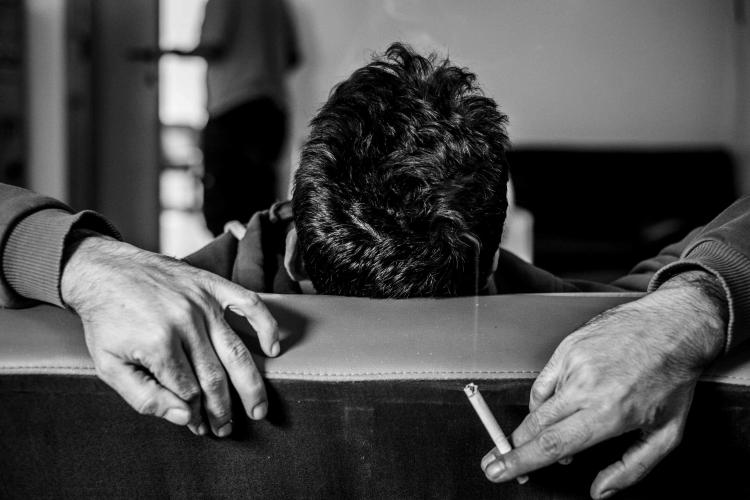Guest post by Emma Humphris, a graduate student at the Centre for Criminology interested in the use of media and films to advocate against miscarriages of justice and promote conflict resolution. She has extensive experience in the Middle-East, and especially Lebanon, where she studied and worked for the Association of Justice and Mercy (AJEM), which provides legal and social services in Lebanese prisons. She holds a BA in Politics from Sciences Po Paris and a degree in Philosophy from Sorbonne Paris IV.
Within the context of Lebanese prisons characterized by violence, discrimination, and corruption, foreign prisoners are subject to particular abuse with failures in due process and recurrent cases of arbitrary detention. This vulnerable population largely includes Syrian refugees, non-ID Lebanese and Palestinian refugees, Iraqi and Sudanese refugees, and migrant workers. Refugees are afforded no legal protection in the country since Lebanon has not ratified the 1951 Geneva Convention relating to the status of refugees, their rights and the legal obligations of states. At present, 36% of Lebanon’s prisoners are foreigners. Syrian refugees, in particular, represent 30% of the total incarcerated population distributed over 22 prisons, living in deplorable conditions and experiencing daily conflict and challenges with co-detainees and security forces. Their irregular status in the country has resulted in consistent discriminatory abuse in the Lebanese criminal justice system.
The Lebanese Center for Human Rights (CLDH) has conducted extensive research on the arbitrary detention of foreign prisoners. CLDH’s findings expose the fact that foreign prisoners, unlike Lebanese citizens, are rarely released upon completion of their sentences. Instead, they are transferred to the General Security, the Lebanese intelligence agency in charge of borders and security, and placed in administrative detention before being released to the Lebanese community or repatriated. Unless there is evidence that the individual is a threat to national security and public safety, Lebanese laws do not stipulate any specific guidelines for administrative detention, resulting in heavy use of discretion and high potential for power abuse without clear accountability procedures. The core of the problem, however, is that the General Security does not have the capacity to process all these prisoners efficiently. This means that foreign prisoners end up waiting up to three months in prisons, police stations, and/or courtrooms. These ‘transitory’ detention centres have been reported for their violent and abusive policies, with cases of torture exposed by the CLDH. Once admitted to the General Security, the length of detention becomes ambiguous with very little oversight, making statistics impossible to obtain by organizations and human rights defenders.

The arbitrary detention of foreign prisoners is further exacerbated by prolonged pre-trial detention, which can last from a few months to a couple of years, irrespective of the nature of the charges. This practice is in contradiction with international standards that require Lebanon to bring defendants before a judge promptly, and with Article 47 of the Lebanese Code of Penal Procedures, which assures the right to meet a lawyer and to be brought before the judge in due time. The delays in judicial procedures can be attributed to the absence of a legal representative and an interpreter, the lack of logistical means such as transportation from the prison to court, and explicit discriminatory practices. These delays are particularly serious because of the systematic failure to release foreigners at the end of the maximum term of the pre-trial detention and to comply with international standards and Lebanese law.
As a supportive worker for the Association of Justice and Mercy (AJEM), I had access to Lebanese prisons Roumieh and Zahle as well as AJEM’s rehabilitative facilities. Most of my visits involved following psychologists and social workers to draw reports on their work and cases. It became obvious to me that both psychologists and social workers were the ‘last resort’ for refugees and migrant workers to get any fair treatment and legal representation. I was confronted with multiple cases of arbitrary detention of, mostly, refugees and migrant workers who didn’t speak Arabic, English, or French. I was particularly moved by the case of a schizophrenic Sri Lankan woman charged with murder. Her trial was consistently delayed over a period of five years because she couldn’t find any legal representation and her mental health didn’t allow her to ensure her own defence. The seriousness of the charge, her nationality, and her mental health became reasons to dismiss her case and to refuse her any support. She was ultimately ‘forgotten,’ and was left begging for information and support from sporadic volunteers and social workers in the prison. Her experience, however, is by no means an exception. Most of AJEM’s psychologists’ files involved cases of refugees and migrant workers facing major psychological problems and secondary traumas caused by lack of information and support during their detention. These cases clearly convey the harsh realities and consequences of a Lebanese criminal justice system that discriminates and marginalizes not only foreigners, but also mentally ill prisoners, as well as those caught in both groups.

AJEM’s rehabilitation centre also gave me insight into what becomes of refugees and migrants who are released but are still considered ‘illegal’ in the country. The lack of resources and funding forced AJEM’s rehabilitation centre to be highly selective of the prisoners they could let in and support. Yet, the centre also had an obligation to provide support to those in ‘desperate’ and extreme cases where immediate protection is needed, such as former political prisoners, refugees with mental disabilities, and severe drug addicts with no social and familial support. In a state of emergency, the centre struggles to perform its role and its rehabilitative ideals, as reintegration of its patients appears more and more unlikely in the face of political and legal pressures. Its therapeutic activities such as art, gardening, and music workshops provide temporary relief but cannot compensate for the major reluctance of the Lebanese government and Lebanese society to reintegrate refugees and migrants who have been incarcerated. The negative image of inmates in Lebanese public opinion is one of the major inhibiting factors to promoting effective rehabilitation. Being a migrant or a refugee is an additional stigma, which clearly reduces the chance to find work and a supportive social network within the Lebanese community.
Non-governmental organizations―such as the Association of Justice and Mercy, Catharsis, and the Lebanese Centre for Human Rights―are working on the grounds to raise awareness about the cases of arbitrary detention and torture of national and foreign inmates. However, a couple of months ago, human rights defenders Ms Marie Daunay and Mr Wadih Al-Asmar were accused of ‘defamation’ by the head of the Amal party and faced the possibility of imprisonment after the publication of a report on torture and arbitrary detention in Lebanese prisons. Speaking out for prisoners, and especially foreigners, in Lebanon is highly controversial and political. The focus of mass media on religious extremists in Roumieh has negatively affected the humanitarian debate on prison conditions in Lebanon. There is an urgent need for the international community to shift their focus and support these activists if we are to hope for any change for refugees and migrant workers currently detained in Lebanese prisons.
Any comments about this post? Get in touch with us! Send us an email, or post a comment here or on Facebook. You can also tweet us.
__________
How to cite this blog post (Harvard style):
Humphris, E. (2016) Speaking Out for Foreigners in Lebanese Prisons Available at: https://www.law.ox.ac.uk/research-subject-groups/centre-criminology/centreborder-criminologies/blog/2016/03/speaking-out-0 (Accessed [date]).
Share:








